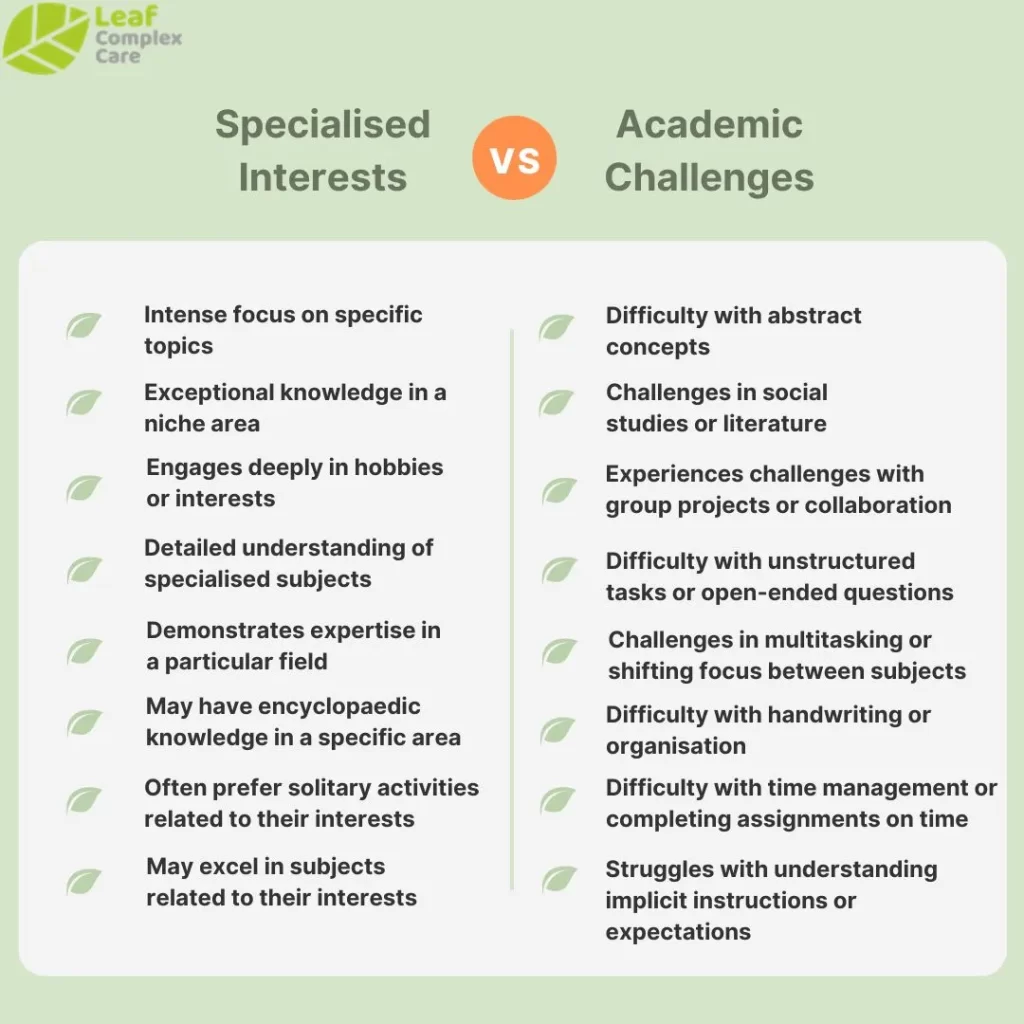Definition of Asperger’s Syndrome
Asperger’s syndrome, also known as Asperger’s, is a neurological difference characterised by significant challenges in social interaction, along with repetitive patterns of behaviour and interests. It is part of the autism spectrum, which includes a range of neurodivergent experiences.
In the past, Asperger syndrome was used to diagnose individuals on the autism spectrum who did not have a concurrent learning disability. However, it is now widely accepted that what was previously known as Asperger syndrome falls within the broader autism spectrum, and there is no longer a need for a distinct term.

Is Asperger’s Classed as a Learning Disability?
Asperger’s is not classified as a learning disability. It also differs from specific learning difficulties such as dyslexia, dyscalculia or attention deficit hyperactivity disorder.
Learning disabilities primarily affect an individual’s ability to learn particular skills and understand complicated information. Asperger’s syndrome is part of the autism spectrum and is a neurological difference that affects broader aspects of development, including social interaction and behaviour. This distinction is important because individuals with Asperger’s require different support and accommodations.
While individuals with Asperger’s may excel in certain areas, such as memorisation or attention to detail, they often have challenges with social skills, understanding nonverbal cues, and forming relationships. However, everyone is different, and some individuals with Asperger’s syndrome may also experience challenges in learning and academics.
Leaf Complex Care’s ultimate goal is to enable individuals to live more full and independent lives in the comfort of being surrounded by the people and things they truly love through tailored care plans that focus on their unique strengths and needs.
This includes providing specialised therapies, such as speech and language therapy and occupational therapy, to develop skills that enhance independence in daily activities. Additionally, our team works closely with families and caregivers to provide education and support, helping to create a supportive environment that fosters independence.
Key Characteristics and Diagnostic Criteria
Asperger’s syndrome, once considered a distinct diagnosis, is characterised by a strong preference for routines, communication challenges, and cognitive strengths. People may also have highly focused interests, often to the exclusion of other activities and may find it difficult to adapt to new situations or environments.
Social Communication Challenges
People with Asperger’s syndrome often face communication difficulties, including understanding social norms and nonverbal cues such as facial expressions, tone of voice, and body language. They may need help initiating and maintaining conversations, often needing support with social cues indicating when to speak or listen. Additionally, they may have difficulty understanding the perspectives of others, which can lead to challenges in interpreting sarcasm, irony, or figurative language. These difficulties can contribute to difficulty in forming and maintaining friendships.
With the right support, individuals with Asperger’s can find different ways to navigate social situations and build meaningful relationships, contributing their unique perspectives and talents to the world around them.
Repetitive Behaviours and Restricted Interests
Repetitive behaviours can include actions like hand-flapping, rocking, or repeating phrases or movements. These behaviours and feelings are often soothing or self-stimulating in nature.
Restricted interests refer to intense, focused interests in specific topics or activities. For example, someone with Asperger syndrome might develop a deep fascination with trains, maps, or a particular historical period. They may spend a significant amount of time learning about and engaging with their chosen interest, sometimes to the exclusion of other activities. Additionally, individuals with Asperger’s syndrome may face challenges in understanding abstract ideas and need additional support.
Despite these challenges, individuals with Asperger’s syndrome often possess unique strengths and abilities. Their intense focus and attention to detail can lead to a deep understanding of their areas of interest, enabling them to develop specialised knowledge and skills.
Cognitive Strengths and Unique Talents
People with Asperger’s syndrome often have cognitive strengths and unique talents that can be quite remarkable. Some individuals display exceptional memory skills, particularly for facts, details, or specific topics of interest. Their ability to focus intensely on a particular subject can lead to deep knowledge or expertise in that area. Additionally, many individuals with Asperger’s have a strong attention to detail and a high level of precision in their work. These cognitive strengths and talents can be valuable in certain professions or hobbies, where meticulous attention to detail and deep focus are assets.
Distinctive Traits vs. Learning Disabilities
Distinctive traits refer to the characteristic features of Asperger’s syndrome in individuals, such as challenges in social interaction, nonverbal communication, anxiety and restricted or repetitive behaviours and interests. These traits are part of the core characteristics of Asperger’s syndrome and are typically present throughout the individual’s life.

On the other hand, learning disabilities affect how people learn and develop skills throughout their lives. Some individuals with Asperger’s syndrome experience challenges in learning and may need additional support. However, these challenges are not considered primary features of Asperger’s.
It’s important to note that while people with Asperger’s syndrome may have learning disabilities, not everyone does, and the presence of a learning disability does not define Asperger’s.
Communication Challenges vs. Language Impairment
Communication challenges in individuals with Asperger’s syndrome typically refer to difficulties in social communication, such as understanding nonverbal cues (like facial expressions and body language), maintaining conversations, and interpreting social situations.
Language impairment, on the other hand, refers to difficulties in the development or use of spoken language. While some individuals with Asperger’s may have language impairments, such as delays in speech development or difficulty with grammar or syntax, others may have strong verbal abilities but still struggle with language and the social aspects of communication.
The communication challenges can be related to:
- Difficulty interpreting tone of voice – Individuals with Asperger syndrome may find it challenging to understand the emotional meaning behind different tones of voice, leading to conversation misunderstandings.
- Challenges with figurative language – Many individuals with Asperger’s have difficulty understanding figurative language, such as idioms or metaphors, and often interpret them literally.
- Limited eye contact – Some individuals with Asperger syndrome may have difficulty maintaining eye contact during conversations, which can be perceived as disinterest, even though it’s not intentional.
- Repetitive speech patterns – It’s common for individuals with Asperger syndrome to use repetitive speech patterns, such as repeating specific phrases or topics, which can sometimes make the conversation seem one-sided.
- Difficulty with turn-taking in conversation – Individuals with Asperger’s may struggle with the back-and-forth nature of conversations, finding it challenging to know when to speak and when to listen.
Language challenges may be related to the following:
- Difficulty with the rhythm, pitch, or tone of speech that leads to a unique vocal quality.
- Tendency to focus intensely on specific topics of interest, leading to one-sided conversations.
- Strong grammar or language rules sometimes lead to pedantic or formal speech.
- Sensitivity to specific sounds or textures may affect their ability to communicate in noisy or crowded environments.
- Preference for structured or routine communication, finding unstructured or ambiguous conversations difficult.
Leaf Complex Care’s Therapy Team
Leaf Complex Care’s therapy team consists of speech and language therapists who can support individuals with language impairments associated with Autism Spectrum Disorder (ASD) through:
Assessment: Speech and language therapists can conduct comprehensive evaluations to identify the specific nature of the language impairments and how they impact the individual’s communication skills.
Tailored and Person-centred Individualised Therapy: Based on the assessment findings, therapists can develop personalised therapy plans tailored to the individual’s needs, focusing on improving speech clarity, language comprehension, and social communication skills
Sensory Integration: Some individuals with Asperger’s syndrome may have sensory processing difficulties that impact their communication. Our specialists can provide strategies to manage sensory challenges and improve communication.
Collaboration and the Right Support: Our therapists can collaborate with other therapy team members, such as occupational therapists and Positive Behaviour Support (PBS) practitioners, to provide holistic support that addresses the individual’s needs.
Specialised Interests vs. Academic Challenges
The following table illustrates examples of specialised interests and the academic challenges of individuals living with Asperger syndrome:

Get Support with Leaf Complex Care
If you’re looking for specialised support for a loved one with complex care needs, Leaf Complex Care is here to help. Our team of highly-trained clinicians is dedicated to providing tailored support primarily for autistic people and individuals living with a learning disability. Whether you’re seeking speech and language therapy, occupational therapy, or Positive Behaviour Support, we offer free-of-charge services to enhance people’s quality of life.
HOW WE SUPPORT THE PEOPLE WE SERVE:
Through Harley’s story, who is one of the individuals we serve, explore how Leaf Complex Care’s multidisciplinary team collaborated to address his specific needs and challenges, resulting in Harley living life on his own terms.
‘’He can now communicate his needs to staff, although we are supporting him to continue to grow in this area.’’

Anold K. Harley’s support worker.

‘’In this short period of time (3 months), we have seen Harley’s communication skills grow and challenging behaviours decrease. Harley also has a greater understanding, and his confidence has grown within the community.’’
Cara Turner
Deputy Registered Manager in Leaf Complex Care in Birmingham
Contact us today to discuss how we can create a personalised care plan that meets your unique needs and goals. We deliver our care and support across the UK. For more details, visit our Bristol, South East, Birmingham and Somerset offices.

